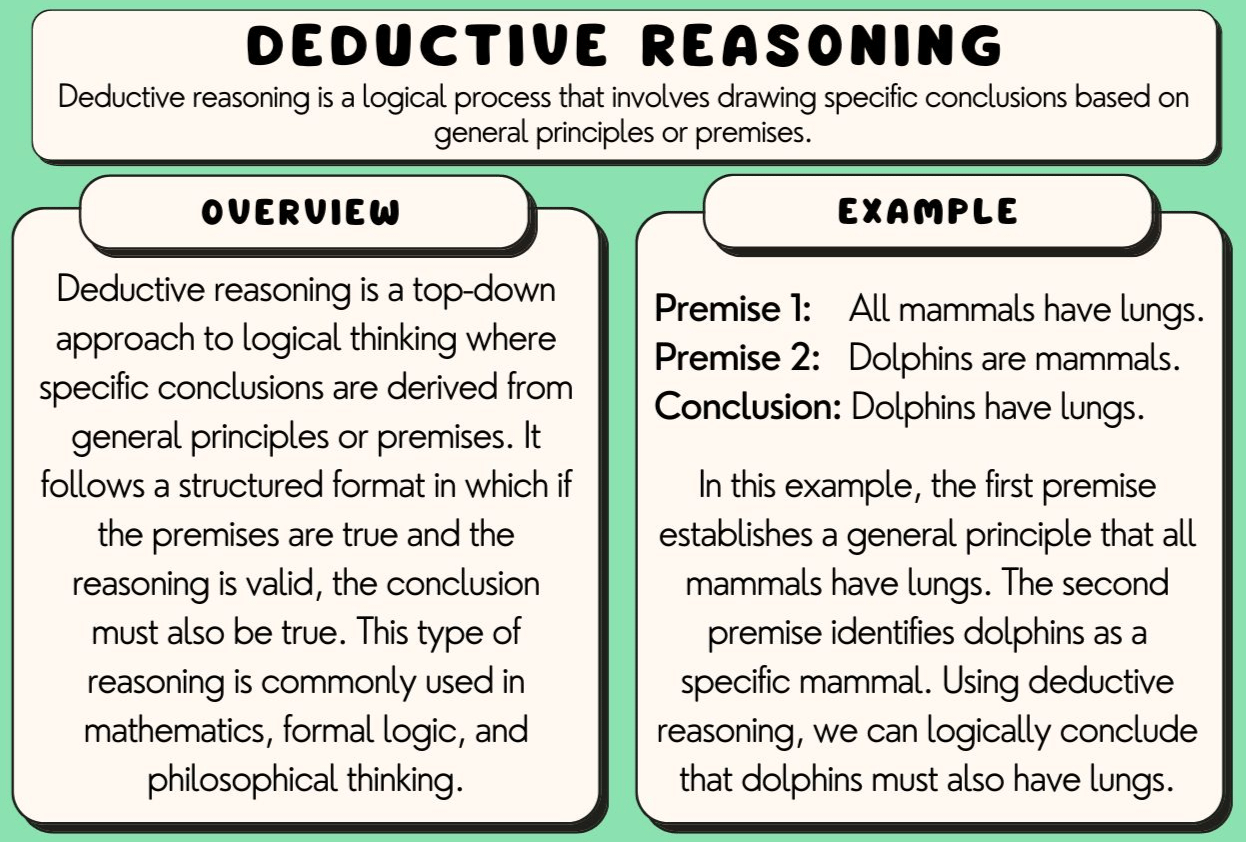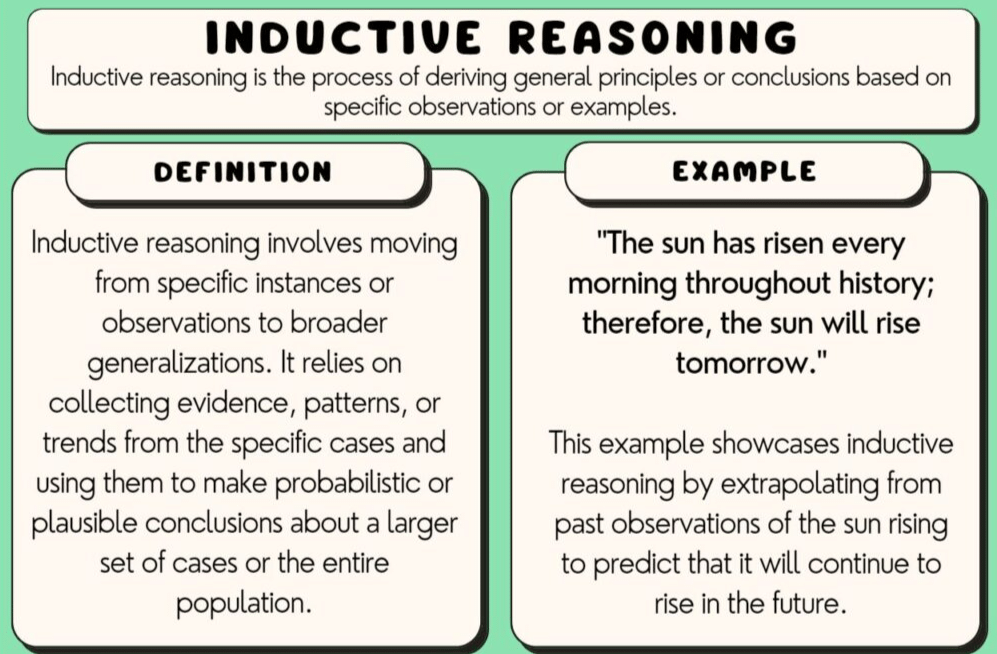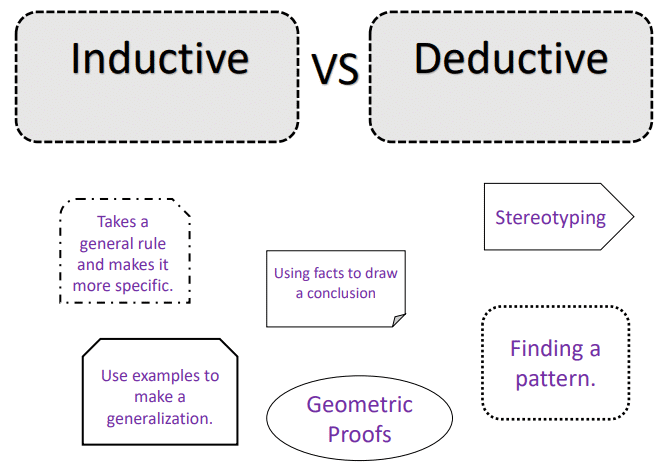Study Deductive and Inductive Reasoning - 1 - Logical Reasoning Notes
Deductive Reasoning
- Deductive reasoning sets off with general ideas, called premises, and applies them to a specific situation. Rules, laws, theories, and other recognized conventional truths are used to confirm that a conclusion is correct.
- The concept of deductive reasoning is articulated visually using a funnel that narrows a general idea into a specific conclusion. In practice, the most basic form of deductive reasoning is the syllogism, where two premises that share some idea support a conclusion.
- It is easier to comprehensively think of syllogisms like the following theorem: If A=B and C=A, then B=C.
 For instance
For instance
(a) All organs are made out of living tissue.
- All humans have organs.
- Therefore, all humans are made out of organs.
- Above statements states that the premises prove the conclusion, not justify it. Deductive reasoning is meant to demonstrate that the conclusion is absolutely true based on the logic of the premises.
(b) All violins make sounds.
- Airplanes make sounds.
- Therefore, airplanes are the violin.
- The syllogism on the above statements contains two objectively true premises, but its conclusion is false because it is plausible for airplanes and violins to be totally separate entities while still having the same characteristics.
(c) All art is a reflection of nature.
- Dancing is art.
- Therefore, Dancing is a reflection of nature.
- Here, the syllogism has premises that overlap and use them to verify that a statement is absolutely true. Though deductive arguments rarely come in the exact form of a syllogism, the same thought process can be used to evaluate their strength and create counterarguments.
Inductive Reasoning
- Inductive reasoning employs a set of specific observations to reach a comprehensive conclusion; it is the opposite of deductive reasoning. It sets off with narrow premises and develops into a wider conclusion. There is no tantamount to a syllogism in inductive reasoning which means there is no basic standard format.
- All forms of inductive reasoning, albeit, are based on finding a conclusion, is most likely to fit the premises and used when making predictions, creating generalizations, and analyzing cause and effect. An inductive argument is either considered weak or strong based on whether its conclusion is a probable explanation for the premises.
- While deductive arguments are employed to prove a conclusion, inductive arguments are intended to predict a conclusion. They do not create a definite answer for their premises, but they try to show that the conclusion is the most probable one given the premises.
 (a) My neighbor’s dog barks at me daily.
(a) My neighbor’s dog barks at me daily.
- At the pet store, all the dogs bark at me.
- Therefore, all dogs probably hate me.
- In the above example, there are
- In above example, there are several possible reasons for the dog’s hostile treatment towards the person such as a person uses a perfume which the dogs hate, etc, but since it is not acknowledged in the premises, it cannot be contemplated possible conclusion. The most probable conclusion, given the premises that have been supplied, is that dogs hate the person.
- An inductive argument is either considered weak or strong based on whether its conclusion is a probable explanation for the premises.
(b) The cost of college has been increasing over the past several decades.
- Therefore, higher taxes on the rich are probably the best way to help middle-class America thrives.
- Above inductive reasoning, the example can be viewed as weak because the given two statements are likely true on their own, but the first premise doesn’t predict the second to be true as there is no palpable correlation between the two.
(c) The past five James Bond movies have been incredibly successful at the box office.
- Therefore, the next James Bond movie will probably be successful.
- Above inductive reasoning, the example can be viewed as strong because the given premise identifies a pattern, and the conclusion provides a logical continuation of this pattern without embellishment.

Conclusion
Deductive and inductive reasoning serve as two fundamental approaches to logical thinking. Deductive reasoning begins with general premises and applies them to specific cases to reach a definite conclusion, as seen in syllogisms. It aims to prove a conclusion with certainty, provided the premises are true. In contrast, inductive reasoning moves from specific observations to broader generalizations, aiming to predict outcomes based on patterns rather than absolute certainty. While deductive reasoning ensures logically valid conclusions, inductive reasoning offers probable conclusions that can be strong or weak depending on the strength of the premises. Both forms of reasoning play essential roles in critical thinking, problem-solving, and decision-making.
|
31 videos|44 docs|14 tests
|
FAQs on Study Deductive and Inductive Reasoning - 1 - Logical Reasoning Notes
| 1. What is the difference between deductive and inductive reasoning? |  |
| 2. How is deductive reasoning used in the UGC NET exam? |  |
| 3. Can you provide an example of deductive reasoning? |  |
| 4. Why is inductive reasoning important alongside deductive reasoning? |  |
| 5. What strategies can help improve deductive reasoning skills for the UGC NET exam? |  |
















